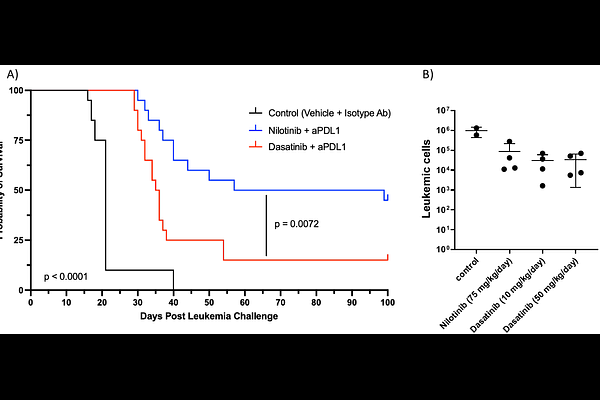PDL1 CHECKPOINT BLOCKADE SYNERGIZES WITH NILOTINIB BUT NOT DASATINIB TO PREVENT LEUKEMIA RELAPSE

PDL1 CHECKPOINT BLOCKADE SYNERGIZES WITH NILOTINIB BUT NOT DASATINIB TO PREVENT LEUKEMIA RELAPSE
Morgan, E. C.; Venkatesh, H.; Centenos, E. G.; Heltemes-Harris, L. M.; Hubbard, G.; Maiers, T. L.; Dileepan, T.; Tracy, S. I.; Farrar, M. A.
AbstractDasatinib and nilotinib are front line Tyrosine Kinase Inhibitors (TKIs) used to treat BCR-ABL+ B cell acute lymphoblastic leukemia (B-ALL) and BCR-ABL+ chronic myelogenous leukemia. We previously showed that combining nilotinib with anti-PD-L1 blockade significantly reduced leukemia relapse. The TKI dasatinib is more commonly used to treat to B-ALL. However, unlike nilotinib, dasatinib also inhibits SRC-family kinases, which may make it less efficacious in combination with anti-PDL1 blockade. Herein we assess the impact of nilotinib versus dasatinib on anti-leukemia immune responses. Dasatinib, but not nilotinib, inhibited T cell proliferation at high doses in-vitro, but neither TKI significantly impacted T cell function or expansion in response to immunization in-vivo with a model antigen (2W1S) plus polyIC-adjuvant. Dasatinib and nilotinib both reduced leukemic blasts equivalently after 5 days of treatment. In contrast, nilotinib and PD-L1 blockade, but not dasatinib plus anti-PDL1, prevented relapse several weeks later. Thus, dasatinib negatively impacts protective anti-leukemia T cell responses that prevent leukemia relapse.